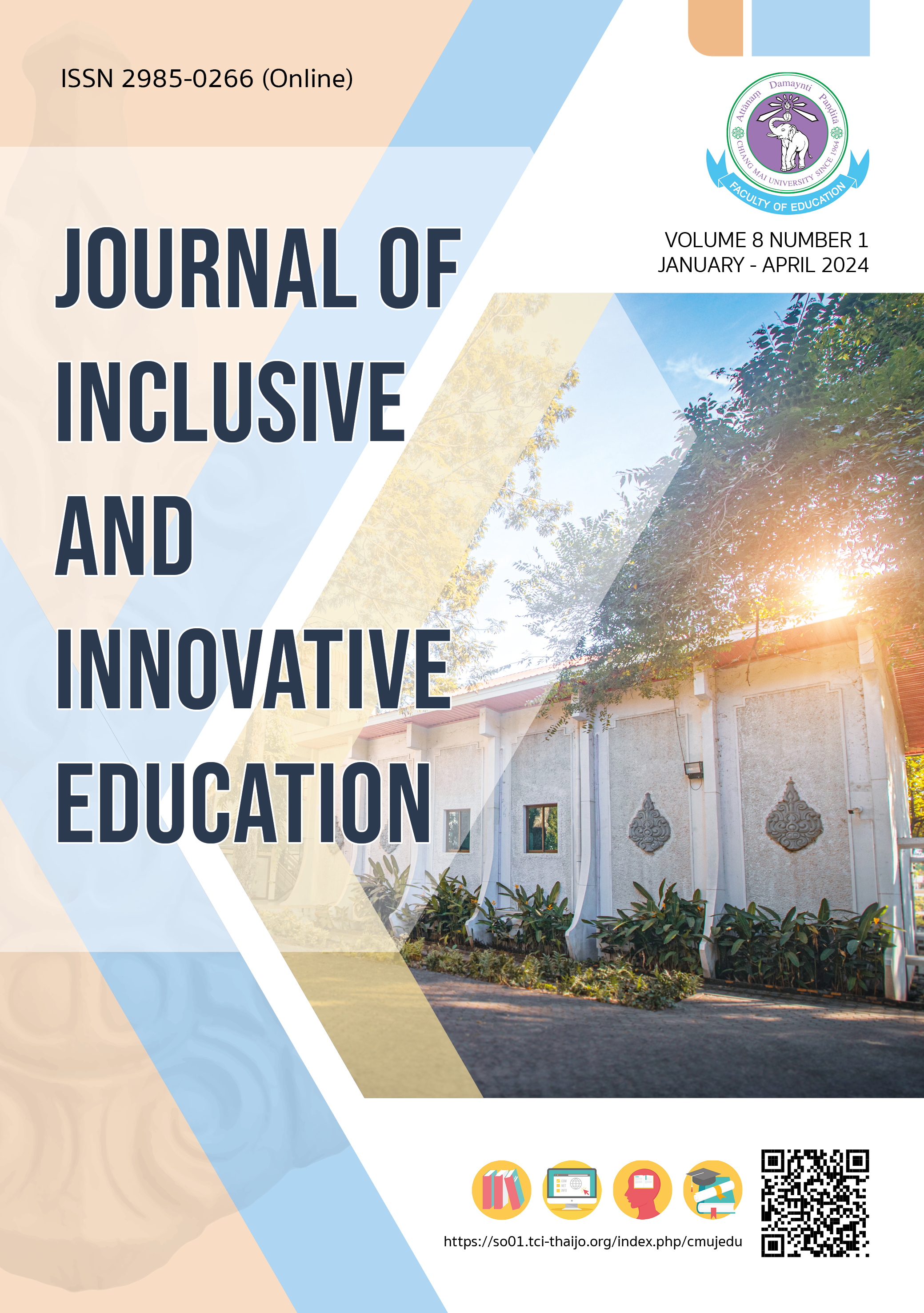โมเดลการวัดความเป็นผู้ประกอบการของนักศึกษาระดับประกาศนียบัตรวิชาชีพชั้นสูงสังกัดสำนักงานคณะกรรมการการอาชีวศึกษา จังหวัดเชียงใหม่
Main Article Content
บทคัดย่อ
การวิจัยครั้งนี้มีวัตถุประสงค์เพื่อพัฒนาและตรวจสอบความตรงของโมเดลการวัดความเป็นผู้ประกอบการของนักศึกษาระดับประกาศนียบัตรวิชาชีพชั้นสูง สังกัดสำนักงานคณะกรรมการการอาชีวศึกษา จังหวัดเชียงใหม่ จำนวน 550 คน สุ่มตัวอย่างโดยใช้การสุ่มตัวอย่างแบบแบ่งชั้น (Stratified Random Sampling) เครื่องมือวิจัย คือ แบบสอบถามความเป็นผู้ประกอบการ แบบมาตรประมาณค่า 5 ระดับ จำนวน 29 ข้อ ค่าความเชื่อมั่นทั้งฉบับ (Reliability) เท่ากับ 0.936 วิเคราะห์ข้อมูลด้วยสถิติเชิงบรรยายและการวิเคราะห์องค์ประกอบเชิงยืนยันอันดับสอง (Second Order Confirmatory Factor Analysis: 2nd CFA) ด้วยโปรแกรม Mplus 7.4 ผลการวิจัยพบว่า โมเดลการวัดความเป็นผู้ประกอบการของนักศึกษาระดับประกาศนียบัตรวิชาชีพชั้นสูง มีความตรงเชิงโครงสร้างและสอดคล้องกลมกลืนกับข้อมูลเชิงประจักษ์ ประกอบด้วย 4 องค์ประกอบ 10 ตัวบ่งชี้ ได้แก่ 1) ความกล้าเสี่ยง มี 2 ตัวบ่งชี้ คือ ความกล้าได้กล้าเสีย และความอดทนต่อความล้มเหลว 2) ความมีนวัตกรรม มี 2 ตัวบ่งชี้ คือ การมีความคิดริเริ่มสร้างสรรค์ และการใช้เทคโนโลยีในการทำงาน 3) การทำงานเชิงรุก มี 3 ตัวบ่งชี้ คือ การวางแผนการทำงานล่วงหน้า การแสวงหาโอกาส และความสามารถในการแข่งขัน และ 4) ความต้องการความสำเร็จ มี 3 ตัวบ่งชี้ คือ การมีเป้าหมายในการทำงานที่ชัดเจน ความมุ่งมั่นพยายามทำงานให้เสร็จ และความรับผิดชอบในการทำงาน มีค่าความสอดคล้องกลมกลืนเท่ากับ x^2= 22.777, df =16, p-value = 0.1198, CFI = 0.998, TLI = 0.993, RMSEA = 0.028, SRMR = 0.014 ผลการวิเคราะห์ข้อมูลพบว่า ค่าน้ำหนักองค์ประกอบลำดับขั้นที่ 1 มีค่าระหว่าง 0.666 ถึง0.846 และค่าน้ำหนักองค์ประกอบลำดับขั้นที่ 2 มีค่าระหว่าง 0.934 ถึง 0.960 โดยองค์ประกอบความต้องการความสำเร็จ มีค่าน้ำหนักองค์ประกอบสูงสุด รองลงมาคือ การทำงานเชิงรุก, ความมีนวัตกรรม และความกล้าเสี่ยง ตามลำดับ
Article Details

อนุญาตภายใต้เงื่อนไข Creative Commons Attribution-NonCommercial-NoDerivatives 4.0 International License.
หากผู้เสนอบทความมีความจำเป็นเร่งด่วนในการตีพิมพ์โปรดส่งลงตีพิมพ์ในวารสารฉบับอื่นแทน โดยกองบรรณาธิการจะไม่รับบทความหากผู้เสนอบทความไม่ปฏิบัติตามเงื่อนไขและขั้นตอนที่กำหนดอย่างเคร่งครัด ข้อมูลของเนื้อหาในบทความถือเป็นลิขสิทธิ์ของ Journal of Inclusive and Innovative Education คณะศึกษาศาสตร์ มหาวิทยาลัยเชียงใหม่
เอกสารอ้างอิง
Achtenhagen, L. (2020). Entrepreneurial orientation–An overlooked theoretical concept for studying media
firms. Nordic Journal of Media Management, 1(1), 7-21.
Bolton, D. L., & Lane, M. D. (2012). Individual entrepreneurial orientation: Development of a measurement
instrument. Education+ Training. 54(2.3), 219-233.
Chokpromanan, W. (2014). The Affects Entrepreneur Characteristic on The Successful Operation of Store
Entrepreneur in Don Wai Floating Market, NakhonPathom Province (Degree Master of Arts Program in Public and Private Management). Graduate School, Silpakorn University. [in Thai]
Covin, J. G., & Slevin, D. P. (1986). The development and testing of an organizational-level entrepreneurship
scale. Frontiers of entrepreneurship research, 1(3), 628-639.
Damrongpanit, S. (2020). Mplus program with behavioral and social science research data analysis.
Bangkok: Chulalongkorn University Press. [in Thai]
Department of Employment. (2016). Future trends in freelance (Research report). Bangkok: Labor Market
Research Division and Employment Promotion Division Department of Employment Ministry of Labor. [in Thai]
EU Skills Panorama. (2014). Entrepreneurial Skills Analytical Highlight. n.p.: The European Commission.
Frederick, H. H., & Kuratko, D. F. (2010). Entrepreneurship, 2nd Asia-Pacific ed. Cengage learning, South
Melbourne.
Frese, M. (2000). Success and failure of microbusiness owners in Africa: A psychological approach.
London: Greenwood Publishing Group.
Gorostiaga, A., Aliri, J., Ulacia, I., Soroa, G., Balluerka, N., Aritzeta, A., & Muela, A. (2019). Assessment of
entrepreneurial orientation in vocational training students: Development of a new scale and relationships with self-efficacy and personal initiative. Frontiers in psychology, 10, 1125.
Gurol, Y., & Atsan, N. (2006). Entrepreneurial characteristics amongst university students: Some insights for
entrepreneurship education and training in Turkey. Education+ training, 48(1), 25-38.
Kamket, W. (2012). Behavioral Science Research Method. Bangkok: Chulalongkorn University Press.[in Thai]
Kerr, S. P., Kerr, W. R., & Xu, T. (2018). Personality traits of entrepreneurs: A review of recent literature.
Foundations and Trends in Entrepreneurship, 14(3), 279-356.
Lomberg, C., Urbig, D., Stockmann, C., Marino, L. D., & Dickson, P. H. (2017). Entrepreneurial orientation: The
dimensions’ shared effects in explaining firm performance. Entrepreneurship theory and practice, 41(6), 973-998.
Lumpkin, G. T., & Dess, G. G. (1996). Clarifying the entrepreneurial orientation construct and linking it to
performance. Academy of management Review, 21(1), 135-172.
Mutluturk, M., & Mardikyan, S. (2018). Analysing factors affecting the individual entrepreneurial orientation
of university students. Journal of Entrepreneurship Education, 21(3), 1-16.
Office of the Education Council (2019. Entrepreneurship Education (Research report). Prikwarn Graphic
Co.,Ltd. [in Thai]
Office of Small and Medium Enterprise Promotion (2020). Report on the situation of small and medium
Enterprises. Bangkok: The Office of SMEs Promotion. [in Thai]
Office of Vocational and Professional Education Standards (2020). Vocational Entrepreneurship Incubator.
Bangkok: Office of the Vocational Education Commission. [in Thai]
Phuthong, T., & Sumalai, N. (2019). The Causal Relationship Model of Factors of Psychological
Characteristics affecting the Youth Digital Business Entrepreneurial Intention among BBA Students. Veridian E-Journal, Silpakorn University, 12(6), 418-444. [in Thai]
Pradana, M., & Kartawinata, B. R. (2020). Indonesian Private University Students’ Entrepreneurial Intention.
Asia Pacific Management and Business Application, 9(2), 111-122.
Puttachaya, J. (2014). Construction of an entrepreneurial characteristics inventory for faculty of business
administration university students in Bangkok (Degree of Master of Education Program in Educational Measurement). Faculty of Education, Srinakharinwirot University. [in Thai]
Rakthai, T., Aujirapongpan, S., & Suanpong, K. (2019). Innovative capacity and the performance of
businesses incubated in university incubator units: Empirical study from universities in Thailand. Journal of open innovation: technology, market, and complexity, 5(2), 33.
Rauch, A., Wiklund, J., Lumpkin, G. T., & Frese, M. (2009). Entrepreneurial orientation and business
performance: An assessment of past research and suggestions for the future. Entrepreneurship theory and practice, 33(3), 761-787.
Sakulsriprasert, C. (2013). Confirmatory factor analysis. Thai Journal of Clinical Psychology, 44(1), 1-16.
[in Thai]
Smithikrai, C. (2003). Entrepreneurial potential of Thai University Students (Research report). Chiang Mai:
Chiang Mai University. [in Thai]
Sornsermsombut, P. (2020). Influence of Characteristics on Entrepreneurial Intention: A Case Study of
Business Administration Students, Chiang Mai Rajabhat University. Journal of Management Science Chiangrai Rajabhat University, 15(2), 117-142. [in Thai]
Sungthip, S. (2010). Factors affecting happiness at work of teachers under the Office of Basic Education
Commission: an application of structural equation model (Degree of Master of Education Program in Educational Research Methodology). Faculty of Education, Chulalongkorn University. [in Thai]
Wongsakorn, R. (2018). The Buddhist Entrepreneurial Orientation for Business Successful Owners of Stand-
alone Drugstores in Bangkok Metropolitan and Perimeter (Degree of Doctor of Philosophy Buddhist Psychology). Graduate School, Mahachulalongkornrajavidyalaya University. [in Thai]


